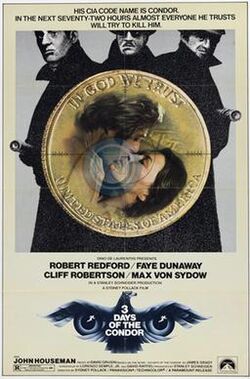Three Days of the Condor
(film) | |
|---|---|
 | |
| Type | file of unspecified type |
| Author(s) | |
| Director(s) | Sydney Pollack |
| 1975 political thriller about a bookish CIA researcher who comes back from lunch one day to discover his co-workers murdered, then subsequently tries to avoid his own murder and outwit those responsible. At the end, it is left open whether his whistleblowing will really be published by the New York Times. | |
Three Days of the Condor is a 1975 American political thriller film directed by Sydney Pollack and starring Robert Redford, Faye Dunaway, Cliff Robertson, and Max von Sydow.[1] Set mainly in New York City and Washington, D.C., the film is about a bookish CIA researcher who comes back from lunch one day to discover his co-workers murdered, then subsequently tries to avoid his own murder and outwit those responsible. At the end, it is left open whether Turner's whistleblowing will really be published by the New York Times.
Contents
Book
The screenplay by Lorenzo Semple Jr. and David Rayfiel was based on the 1974 novel Six Days of the Condor by James Grady.[1]
Plot
Joe Turner is a bookish CIA analyst, codenamed "Condor". He works at the American Literary Historical Society in New York City, which is actually a clandestine CIA office. The staff members examine books, newspapers, and magazines from around the world to compare them to actual operations or to find ideas. Turner files a report to CIA headquarters on a thriller novel with strange plot elements; despite poor sales it has been translated into various languages.
Turner leaves through a back door to get staff lunches. Armed men enter the office and murder the other staffers there. Turner returns to find his co-workers dead; frightened, he grabs a gun and exits the building.
He contacts the CIA's New York headquarters in the World Trade Center from a phone booth and is given instructions to meet Wicks, his head of department, who will bring him to safety. Turner insists that Wicks bring somebody familiar, since "Condor" has never met his departmental head. Wicks brings Sam Barber, a college friend of Turner who is also a non-field CIA employee. The rendezvous is a trap and Wicks attempts to kill Turner, who wounds him before escaping. Wicks kills Barber to eliminate a witness and blames Turner for both shootings. Later, Wicks is killed by an intruder in his hospital room.
Turner encounters a woman named Kathy Hale and forces her to take him to her apartment. He holds Hale hostage while he attempts to figure out what is happening. Hale slowly comes to trust Turner, and they become lovers.
However, Joubert, a European who led the massacre of Turner's co-workers, discovers Turner's hiding place. Turner visits Sam Barber's apartment and spends some tense moments in the elevator with Joubert once the other passengers have left. Outside the building, Joubert tries to shoot Turner, but Turner manages to blend into a small crowd. The next morning, a hitman disguised as a mailman arrives at Hale's apartment, but Turner manages to kill him.
No longer trusting anyone within "the Company", Turner plays a cat-and-mouse game with Higgins, the deputy director of the CIA's New York division. With Hale's help, Turner abducts Higgins, who identifies Joubert as a freelance assassin who has undertaken assignments for the CIA. Back at his office, Higgins discovers that the "mailman" who attacked Turner worked with Joubert on a previous operation. Their CIA case officer was Wicks.
Meanwhile, Turner discovers Joubert's location. Utilizing his U.S. Army Signal Corps training, he traces a phone call and learns the name and address of Leonard Atwood, CIA Deputy Director of Operations for the Middle East. Confronting Atwood at gunpoint in the latter's mansion near Washington, D.C., Turner suggests that his own original report filed to CIA headquarters had exposed a rogue CIA operation to seize Middle Eastern oil fields; fearful of its disclosure, Atwood had privately ordered Turner's section eliminated.
As Atwood confirms this, Joubert enters and unexpectedly kills him, faking a suicide. Atwood's superiors had hired Joubert to eliminate someone who was about to become an embarrassment, overriding Atwood's original contract for Joubert to kill Turner. Joubert suggests that the resourceful Turner leave the country and even become an assassin himself. When Condor declines, saying he just wants to go back to New York, Joubert utters perhaps the most memorable lines of the film:
You have not much future there. It will happen this way. You may be walking. Maybe the first sunny day of the spring. And a car will slow beside you, and a door will open, and someone you know, maybe even trust, will get out of the car. And he will smile, a becoming smile. But he will leave open the door of the car and offer to give you a lift.
Back in New York, Turner has a rendezvous with Higgins near Times Square. Higgins describes the oilfield plan as a contingency "game" that was planned within the CIA without approval from above. He defends the project, suggesting that when oil shortages cause a major economic crisis, Americans will demand that their comfortable lives be restored by any means necessary. Turner points to The New York Times building and Higgins is confused, asking Turner, "What did you do?" Turner says he has "told them a story." Higgins then tells Turner that he is about to become a very lonely man, and he questions whether Turner's whistleblowing will really be published. "They'll print it," Turner defiantly replies. However, as "Condor" begins to walk away, Higgins calls out "How do you know?".
Reception
The film was nominated for the Academy Award for Best Film Editing. Semple and Rayfiel received an Edgar Award from the Mystery Writers of America for Best Motion Picture Screenplay.[1]
References
Wikipedia is not affiliated with Wikispooks. Original page source here